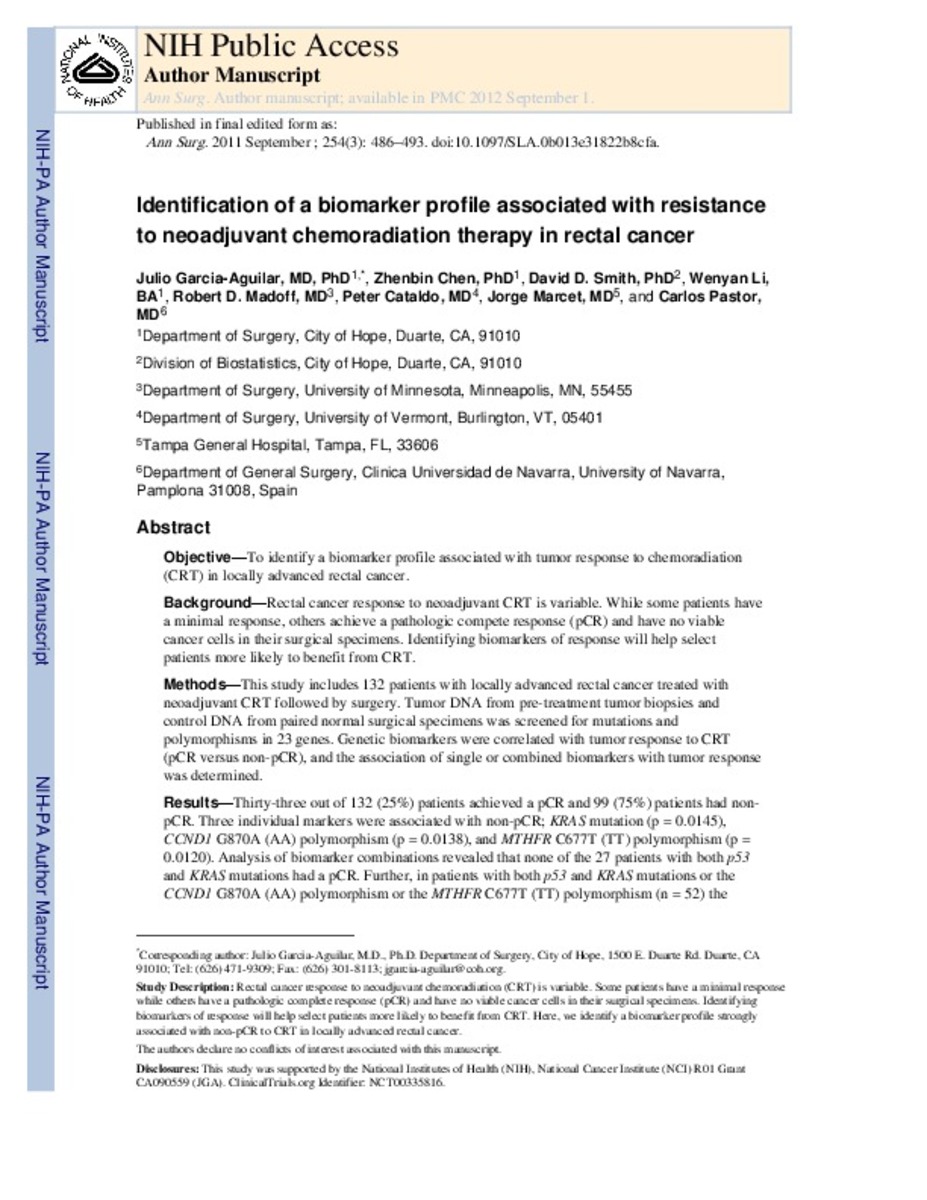Full metadata record
| DC Field | Value | Language |
|---|---|---|
| dc.creator | Garcia-Aguilar, J. (Julio) | - |
| dc.creator | Chen, Z. (Zhenbin) | - |
| dc.creator | Smith, D.D. (David D.) | - |
| dc.creator | Li, W. (Wenyan) | - |
| dc.creator | Madoff, R.D. (Robert D.) | - |
| dc.creator | Cataldo, P. (Peter) | - |
| dc.creator | Marcet, J. (Jorge) | - |
| dc.creator | Pastor, C. (Carlos) | - |
| dc.date.accessioned | 2014-08-14T12:47:18Z | - |
| dc.date.available | 2014-08-14T12:47:18Z | - |
| dc.date.issued | 2011-09 | - |
| dc.identifier.citation | Garcia-Aguilar J, Chen Z, Smith DD, Li W, Madoff RD, Cataldo P, et al. Identification of a biomarker profile associated with resistance to neoadjuvant chemoradiation therapy in rectal cancer. Ann Surg. 2011 Sep;254(3):486-92. | es_ES |
| dc.identifier.issn | 0003-4932 | - |
| dc.identifier.uri | https://hdl.handle.net/10171/36326 | - |
| dc.description.abstract | OBJECTIVE: To identify a biomarker profile associated with tumor response to chemoradiation (CRT) in locally advanced rectal cancer. BACKGROUND: Rectal cancer response to neoadjuvant CRT is variable. Whereas some patients have a minimal response, others achieve a pathologic complete response (pCR) and have no viable cancer cells in their surgical specimens. Identifying biomarkers of response will help select patients more likely to benefit from CRT. METHODS: This study includes 132 patients with locally advanced rectal cancer treated with neoadjuvant CRT followed by surgery. Tumor DNA from pretreatment tumor biopsies and control DNA from paired normal surgical specimens was screened for mutations and polymorphisms in 23 genes. Genetic biomarkers were correlated with tumor response to CRT (pCR vs non-pCR), and the association of single or combined biomarkers with tumor response was determined. RESULTS: Thirty-three of 132 (25%) patients achieved a pCR and 99 (75%) patients had non-pCR. Three individual markers were associated with non-pCR; v-Ki-ras2 Kirsten rat sarcoma viral oncogene homolog mutation (P = 0.0145), cyclin D1 G870A (AA) polymorphism (P = 0.0138), and methylenetetrahydrofolate reductase (NAD(P)H) C677T (TT) polymorphism (P = 0.0120). Analysis of biomarker combinations revealed that none of the 27 patients with both tumor protein p53 (p53) and v-Ki-ras2 Kirsten rat sarcoma viral oncogene homolog mutations had a pCR. Further, in patients with both p53 and v-Ki-ras2 Kirsten rat sarcoma viral oncogene homolog mutations or the cyclin D1 G870A (AA) polymorphism or the methylenetetrahydrofolate reductase (NAD(P)H) C677T (TT) polymorphism (n = 52) the association with non-pCR was further strengthened; 51 of 52 (98%) of patients were non-pCR. These biomarker combinations had a validity of more than 70% and a positive predictive value of 97% to 100%, predicting that patients harboring these mutation/polymorphism profiles will not achieve a pCR. CONCLUSIONS: A specific biomarker profile is strongly associated with non-pCR to CRT and could be used to select optimal oncologic therapy in rectal cancer patients. ClinicalTrials.org Identifier: NCT00335816. | es_ES |
| dc.language.iso | eng | es_ES |
| dc.publisher | Lippincott, Williams & Wilkins | es_ES |
| dc.rights | info:eu-repo/semantics/openAccess | es_ES |
| dc.subject | Rectal Neoplasms/pathology | es_ES |
| dc.subject | Radiotherapy, Adjuvant | es_ES |
| dc.subject | Chemotherapy, Adjuvant | es_ES |
| dc.subject | Drug Resistance, Neoplasm/genetics | es_ES |
| dc.subject | Proto-Oncogene Proteins | es_ES |
| dc.subject | Tumor Markers, Biological | es_ES |
| dc.subject | CCND1 protein, human | es_ES |
| dc.subject | KRAS protein, human | es_ES |
| dc.subject | Organoplatinum Compounds | es_ES |
| dc.subject | Cyclin D1 | es_ES |
| dc.title | Identification of a biomarker profile associated with resistance to neoadjuvant chemoradiation therapy in rectal cancer | es_ES |
| dc.type | info:eu-repo/semantics/article | es_ES |
| dc.identifier.doi | http://dx.doi.org/10.1097/SLA.0b013e31822b8cfa | es_ES |
Files in This Item:
Statistics and impact
Items in Dadun are protected by copyright, with all rights reserved, unless otherwise indicated.






